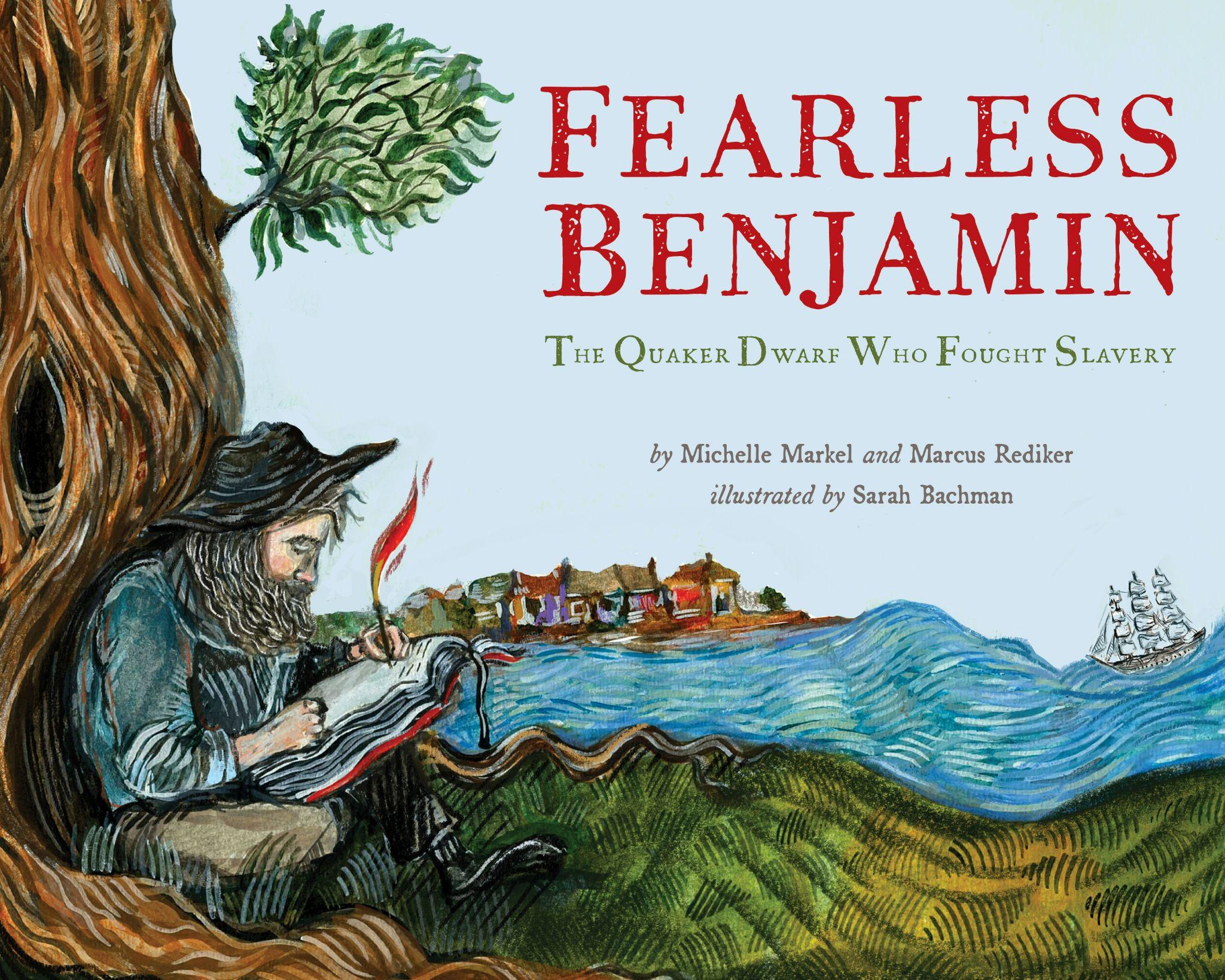
Image credit: Sarah Bachman/PM Press
Fearless Benjamin is a new children’s book by Michelle Markel and Marcus Rediker, illustrated by Sarah Bachman. 32 pages, 10 x 8” hardcover. $18.95. For readers aged 4-8 and up. Pre-order from PM Press.
Michelle Markel creates justice-focused reads for young audiences, such as Brave Girl: Clara and the Shirtwaist Makers’ Strike of 1909.
Marcus Rediker restores unsung protagonists to their rightful places in the human story, and most recently gave us Freedom Ship: The Uncharted History of Escaping Slavery by Sea.
Excavating history from below, Rediker has long pondered the fierce integrity of an 18th-century sailor-turned abolitionist, Benjamin Lay. These musings ripened into a biography, a graphic novel, and an award-winning play (The Return of Benjamin Lay, authored with Naomi Wallace, and featuring Mark Povinelli as Benjamin).
Now, in this latest collaboration, Marcus Rediker joins Michelle Markel to introduce children to the reality of human bondage, and a little person who spent years urging fellow Quakers to denounce it. Informing this true story is Rediker’s study of Quaker records and Benjamin Lay’s own scalding critique of slavekeeping, published in August 1738 by Benjamin Franklin.
As a child, Benjamin is teased for being a different size than the other children…
…but he knows he’s full of goodness.
Benjamin finds work on ships for more than a decade, and finds a lifetime of love with Sarah, who is also a little person and a Quaker. The two sail to Barbados. There, they see slavers working and mocking and torturing people, sometimes to death – people very much like Benjamin’s co-workers on the ships, where life was always a matter of mutual trust and respect for one and all. The grotesque scenes they witness radicalize Benjamin into one of the earliest revolutionary abolitionists.
Benjamin and Sarah sail to Philadelphia, ready to call for the immediate freedom of enslaved people. But when they get there, they find many prominent Quakers implicated in slavery. This infuriates Benjamin, who responds by staging dramatic and confrontational rebellions in the streets and in houses of worship. Benjamin winds up under surveillance, chased out of meetinghouses, banished from Quaker communities, and thrown (yes, physically) into the streets. And then, as the story tells us, “Benjamin and Sarah find a new home, this time in a cave, miles away.”
Years pass…
Until one day
A friend brings the news:
The Quakers will disown members who
Take part in the slave trade!
And so, in the mid-1700s, Quakers come around to Benjamin’s way of thinking. They step up as the first religious group to ban enslavement. Accepting Benjamin’s premise that the Quaker commitment to peace leaves no space for the violence of slavery, they proceed to the forefront of emancipation movements in the Americas and abroad.
Benjamin and Sarah grow old simply, eating only what comes from their garden, as “animals have rights too.” This Earth, all its people, and all its living communities, are precious, Fearless Benjamin reminds us.
Colonialism, systematic and violent oppression, and the fetishization of material goods continue to plague the human spirit. Many of us look away, refrain from calling out injustices, ignore calls for reparations, and gloss over the wrongs as products of their times and contexts. Benjamin reminds us that no matter how small we might feel it’s on us to discern what being “full of goodness” means, and time is of the essence. Not only does justice demand this, but Earth’s systems themselves are handing down their verdict.
By embodying empathy and deep respect, we earn our right to inhabit this planet. Benjamin Lay’s life story is a lesson in courage for young and old, one and all.
Sarah Bachman’s illustrations were made with pencil, ink, acrylic, and gouache. Fearless Benjamin is AI-free, and so is this review.
The post Fearless Benjamin: The Quaker Dwarf Who Fought Slavery appeared first on CounterPunch.org.
This content originally appeared on CounterPunch.org and was authored by Lee Hall.